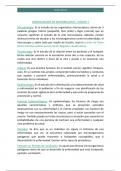2 ATI PEDIATRICS PROCTORED EXAM VERSION 1 Chapter 5: Health Promotion of Preschoolers (3 -6 years) 1. Physical development -Weight: -Gain 2 -3 kg (4.5 -6.5 lb) per year -Height: -Should grow 6.9 -9 cm per year 2. Fine and gross motor skills ▪ 3 Years o Toe and heel walks o Tricycle o Jumps off bottom step o Stands on one foot for a few seconds ▪ 4 Years o Hops on one foot | Skips o Throws ball overhead o Catches ball reliably ▪ 5 Years o Jumps rope o Walks backward o Throws and catches a ball 3. Cognitive development -Piaget: preoperational stage -Moves from totally egocentric thoughts to social awareness and the ability to consider the viewpoint of others -Magical thinkin g: -Thoughts are all -powerful and can cause events to occur -Animism: -Ascribing life -like qualities to inanimate objects 4. Psychosocial development -Erikson: Initiative vs. guilt: -Preschoolers become energetic learners, despite not having all of t he physical abilities necessary to be successful at everything -Guilt can occur when preschoolers believe they have misbehaved or when they are unable to accomplish a task -During stress, insecurity, or illness, preschoolers can regress to previous immature behaviors or develop habits (nose picking, bed -wetting, thumb sucking) 3 5. Age appropriate activities -Preschooler’s transition to associative play -Play is not highly organized, but cooperation does exist between children -Appropriate ac tivities: -Playing ball -Putting puzzles together -Riding tricycles -Playing pretend dress up activities -Role -playing 6. Sleep and rest -On average, preschoolers need about 12 hours of sleep -Keep a consistent bedtime routine -Avoid allowing pre schoolers to sleep with their parents Chapter 6: Health promotion of School -Age children (6 -12 years) 1. Physical development -Weight: -Gain 2 -3 kg (4.4 -6.6 lb.) per year -Height: -Grows 5 cm (2 in.) per year 2. Cognitive development -Piaget: Concrete operations -Able to see the perspective of others 3. Psychosocial development -Erikson: Industry vs. Inferiority -A sense of industry is achieved through the development of skills and knowledge that allows the child to provide meaningful contributions to society -A sense of accomplishment is gained through the ability to cooperate and compete with others -Peer g roups play an important part in social development 4. Age appropriate activities -Competitive and cooperative play is predominant -Play simple board and number games -Play hopscotch -Jump rope -Ride bicycles -Join organized sports (for skill building) 5. Sleep and rest 4 -Need 9 hrs of sleep at age 11 6. Dental health -The first permanent teeth erupt around 6 years of age 1) Which is the rationale for why young children are more prone to otitis media that the nurse should include in the teaching session with a parent? 1. The eustachian tube is shorter, wider, and horizontal in younger children. 2. The eustachian tube is shorter, more narrow, and horizontal in younger children. 3. The eustachian tube is longer, wider, and vertical in younger children. 4. The eustachian tube is longer, more narrow, and vertical in younger children. 2) Which neonate requires a close nursing assessment for the development of retinopathy of prematurity (ROP)? 1. 28-weeks’ -gestation infant who has been on long -term oxygen and weighed 1400 g 2. 32-weeks’ -gestation infant of African heritage with a congenital heart defect who needed no oxygen and weighed 1850 g 3. 28-weeks’ -gestation female infant who was on short -term oxygen, weighed 1420 g, and was treated with phototherapy 4. 36-week s’-gestation, small -for-gestational -age infant who was in an oxyhood for 12 hours and weighed 1800 g 3) Which is the priority nursing assessment for a pediatric client who is postoperative for tonsillectomy? 1. Arrhythmias 2. Dehydration 3. Increased blood sugar 4. Increased urinary output 4) A neonate is diagnosed with a herpes simplex viral infection of the eye. Which medication should the nurse prepare to administer? 1. Oral erythromycin 2. Fluoroquinolone eyedrops or ointment 3. Parenteral acyclovir (Zovirax) and vidarabine (VIRA -A) ophthalmic ointment 5 4. Intravenous penicillin 5) A nurse is caring for a visually impaired 20 -month -old client who has not begun to walk. Which nursing diagnosis would be appropriate for this child? 1. Self-care Deficit 2. Impaired Physical Mobility 3. Impaired Home Maintenance 4. Delayed Development 6) A nurse is caring for a visually impaired school -age child. Which is the priority nursing intervention during the admission process to the hospital?
Exam (elaborations)
ATI PEDIATRICS PROCTORED EXAM
Rating
Sold
-
Pages
241
Grade
A+
Uploaded on
28-11-2023
Written in
2023/2024
ATI PEDIATRICS PROCTORED EXAM
Institution
Chamberlain College Of Nursing
Course
ATI Pediatric Proctored ExaM
Whoops! We can’t load your doc right now. Try again or contact support.
Written for
Document information
- Uploaded on
- November 28, 2023
- Number of pages
- 241
- Written in
- 2023/2024
- Type
- Exam (elaborations)
- Contains
- Questions & answers
Subjects
-
ati pediatrics proctored exam
Content preview
$16.49
Get access to the full document:
100% satisfaction guarantee
Immediately available after payment
Both online and in PDF
No strings attached
Get to know the seller
Tutor002


